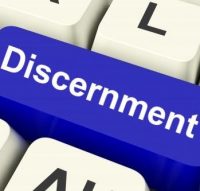I know your works, your toil and your patient endurance, and how you cannot bear with those who are evil, but have tested those who call themselves apostles and are not, and found them to be false. (Revelation 2:2).
(Elizabeth Prata) We live in an age where fellow Christians say that to speak of someone specific being a false teacher is mean, or ill-mannered, or inappropriate. “Just let them alone, God will take care if them,” they say. Or they claim that speaking against false teaching is uncivil, and to “Just pray for them.” Many of thems ay, “You can’t know if he/she is false, you don’t know their heart.”
The skill of discernment (and the gift, too) involves vigilance. It is extremely important. John MacArthur wrote,
In its simplest definition, discernment is nothing more than the ability to decide between truth and error, right and wrong. Discernment is the process of making careful distinctions in our thinking about truth. In other words, the ability to think with discernment is synonymous with an ability to think biblically.
Every book of the New Testament (except Philemon) has some passage or chapter devoted to its writer urging fellow Christians to practice discernment in order to combat some false teaching or other. Jude is entirely taken up with the topic. And the exhortations in those books of the Bible are not to stand by and let false teachers be. Those admonishments are not to tolerate false teaching and wait until Jesus comes back to judge it. Not only the NT writers, but Jesus also has some very explicit thoughts about churches that practice discernment. And those instructions are not to overlook it, be passive abou ti, or ignore it. Quite the opposite.
Related:
